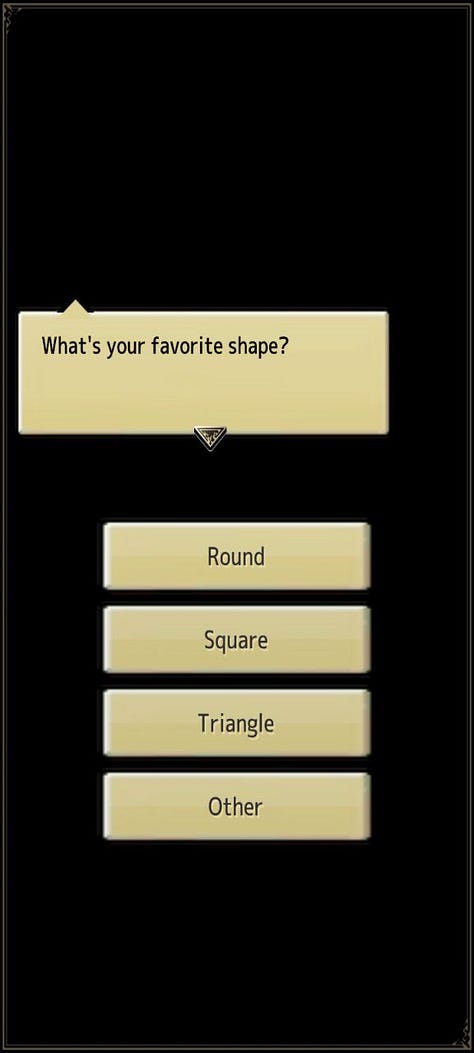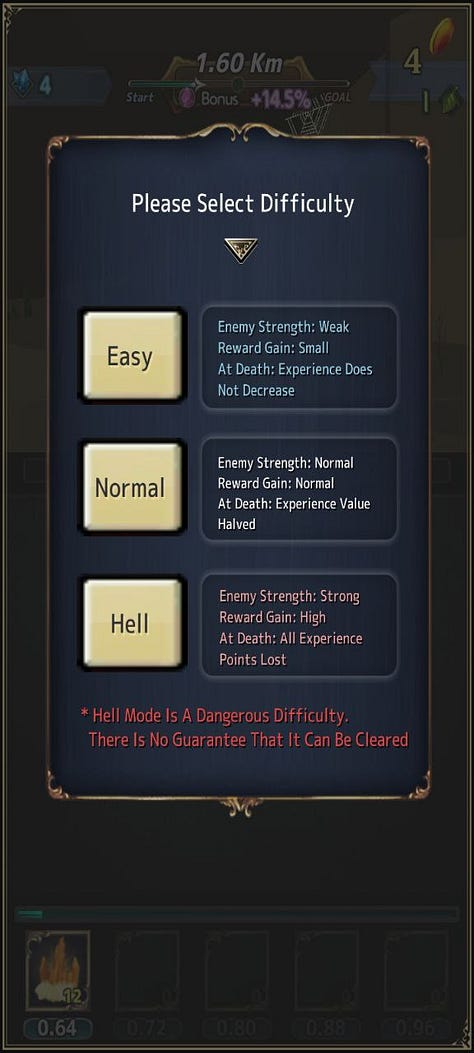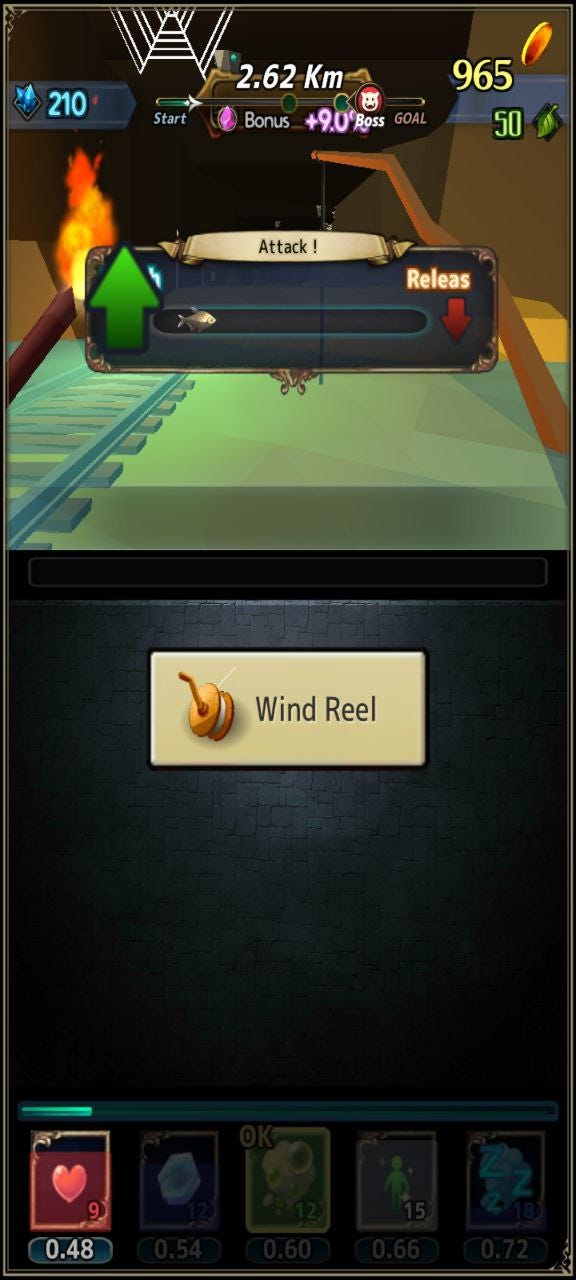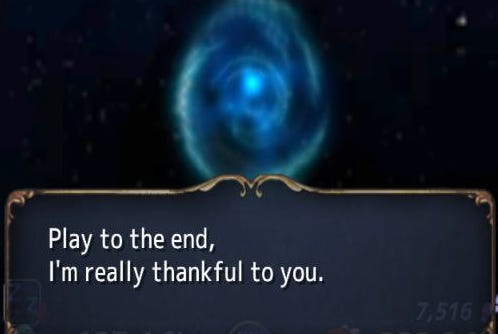Game Review: Magicus
From the creator of Astlibra, this gem was hidden for your own good
If you were to buy and launch Magicus, your first impression would be that it’s some grindy kusoge1 mobile game. It would be your second and third impression, too. Maybe even your final impression as you angrily refunded it.
But why exactly did *I* buy it, you ask? Well, I loved Astlibra, a game by the same creator2 . It’s one of the best action JRPGs of the last decade, mostly for the story, partially for the fun, multi-layered gameplay.
It’s also very obscure, so obscure that 4chan’s /v/ is one of the only places with even semi-regular discussion. It’s in one of these discussion threads that someone posted about Magicus, a single-purchase mobile game with a supposedly amazing story, that no one but them had played.
I went to the app store to check it out, but no dice. The game hadn’t been updated in years, and Android had made some changes that made my OS incompatible with it.3 I decided to email Keizo, the creator, and to my surprise, he actually updated the app so I could buy it.
I did find a mildly interesting plot… amidst the horrible mess of everything else. Before you continue, let me tell you I did not enjoy this game, even though it is clearly more of a real video game than most crap you’ll find on a smartphone, which may have made all the difference to some.



Menus upon menus will welcome you when you open the game, alongside good music and decent 3D graphics (all royalty free assets, as expected from Keizo). If you bothered reading the promotional material, you already know the dev was lying to you:
Smartphone application game.
The stage is a simple RPG of MOVE ON or GO BACK.
The battle is a puzzle type with an emphasis on exhilaration.
Go through many fields and uncover the secrets of the world.
Yes, you navigate through each level by going forward or going back. But you’ll do that comparatively little (and it will feel like too much by the end!). 95% of your gameplay will actually consist of:
Preparing for the next level by navigating between Keizo’s twenty different stat boosting systems (a staple in Astlibra, though way better handled there).
Playing match-3 Bejeweled style battles and completing insultingly simple and repetitive minigames. Here’s some footage.
Before I go in depth about the gameplay, let’s talk about the text first. Magicus isn’t so much machine-translated as optimist-translated. Some of the mistakes in the English translation for this game, like “losted all money”, make me think Keizo merely has an inflated opinion of his own English skills. An automatic translation would have been better, unironically.
I might be a bit of a masochist, because I tolerated the shitty translation nevertheless. In Astlibra there was a similar (now fixed) issue, but it was at least three skill levels above this one. It was charmingly bad, since many of the main characters were actually meant to be idiots and sound like it.
Here, there is no excuse. All my enjoyment instead came from having to figure out how the game works with only the help of flavor text in extremely broken English. Don’t knock it til you try it.

Anyway, this game has a ton of systems. You're expected to understand and utilize all of these systems if you want to make any progress. If you ignore them and merely play the match-3 game, you’re screwed.
The quick rundown is: you traverse a few kilometers of a level, fighting enemies and playing trivial minigames along the way, then go back to town to restock, strategize, and level up. Rinse and repeat.
The slow rundown is, and feel free to skim this, I’m making a point:
The aforementioned battles:
A summons system, which has AI monsters that take some of your hits and help you in fights, usually in very simple ways. You need to spend resources on these. There are more summons than levels in the game, and each summon is stronger than the last, which means 90% won’t see any use.
Two companions, who have spells you can level up, which they will cast sometimes when you match special runes.
Your own spells, which need to be independently leveled up both with resources and by using them. You can only use one spell when you start each level, and the other four are unlocked slowly as you progress. Traps can drain your spell resource pool, too. Spells can inflict status effects, which is the only way to play in my opinion.
A “refresh all gems at once” button. Well, this type of game always has this feature, I assume.
Equipment that you buy at a store4 by exchanging for with monster drops. It raises your stats, obviously, and sometimes gives you oblique bonuses, which you can extract from them and apply to…
“Boards”, which hold “gems” with stat boosts like in some JRPGs.
The “break” system, which puts a monster in stasis and lets you whale on them. It happens sometimes, and there’s a stat associated to it, but I still didn’t understand this mechanic by the point I finished the game.
I do need to mention there’s a real element of turn-based strategy involved. It’s not mindlessly dragging gems around, even though a lot of it is merely defense/attack stat checks.
Random events that are based on stats, D&D (or since this is a Japanese game, I’d say Wizardry)-style. Every few steps you get a single “yes/no” option, you make a stat roll, and if you succeed, you get some resource. From examining bushes to drinking from a pond.5
Fishing (single-button, horribly simple and unfun yet never trivialized). The fish get exchanged in a special store for some unique items. You fish for at least ten hours before you find the store, so your inventory will be filled with unusable resources for half the playtime, I have no idea what he was thinking.
Six different tiers of gacha/lottery (not the “bad” kind, it’s all in-game lottery tickets and not real money), allowing you to roll for unique items (sometimes, often you’ll just get healing potions and the like). I did find an infinite money glitch with this and the fishing shop, which made the late game marginally more tolerable (though not the postgame, more on this later).
A “steps store”, where a guy who I think is meant to be paralyzed rewards you for walking n steps with unique items and rewards. Incredibly funny concept for an NPC.
Unlocking levels non-linearly (you unlock them from conversations with NPCs, or by finishing and sometimes half-finishing levels). You’ll often have like five levels you’ll need to choose from by applying basic logic (is it rated “DANGER”? then you should avoid it). There are a bunch of areas and a navigation system that is way more spread out than it needs to be, which makes “selecting the next level” almost a minigame of its own.
While walking on the level, sometimes a “Grim Reaper” starts chasing you. If you forget the Reaper is chasing you and click “go back” at any point, you die instantly.
While walking on the level, sometimes a “Joker” shows up ahead of you, and the only way to avoid a pointlessly hard and rewardless fight is going back (this and a rare event are the two only uses of the “go back” feature). This and the Reaper can overlap, but thankfully one of the many, MANY usable items allows you to disable the Reaper for a short time.
Negative weather-based effects that force you to use one of those items as protection.
A very simple hunger system, that does nothing but has drawbacks if it goes below 0.
A tree at your house that withers if you die, but if you don’t die for long enough you can harvest for a resource. You also have a bed where you can exchange experience for levels (if you die mid-level you lose half the experience before you can get to the bed, etc etc).

YOU GET THE GIST.
Astlibra handled this kitchen sink game design correctly. Each different system, from weapon leveling to scale balancing had a lot of time and effort put into it to make them fun, a good way to break up the main gameplay segments. In Magicus, however, the systems are a joke. The developer added as many half-assed time wasting elements as he could, because otherwise the combat (which isn’t even that fun!) would get more repetitive than it already does. It’s just busywork!
The bare minimum still does something: the game is very addictive, I have to give it that, but in a bad way. At points, I felt like I was one of the protagonists of Requiem for a Dream. I couldn’t fucking wait for the game to be over. It took me around twenty-five hours to reach the True Ending, after which I had to fight my Id to uninstall the app before I decided to go for postgame content.
So I’ve gone over the gameplay a bit. What about the story?
Well, right off the bat, it’s not good. You’re a girl that gets transported to Another World, where a Queen tells you you need to collect seven orbs to banish the Demon King…
The sheer level of genericity might make you think there’s a subversion or twist here, and you’d be right.
I’m left with a dilemma here. Both the /v/ anon and basically everyone who’s mentioned this game on the Internet refused to share the “intricacies” of the plot, I guess out of respect for the developer. I respect Keizo a lot after playing Astlibra Revision. I don’t respect the version of Keizo that made this terrible fucking game. So here we go.
You have two companions, Garibe (a bookworm who’s been uncovering a mysterious conspiracy) and Mona (a ditz with a low “Number”, which makes her a pariah for complex social reasons).6 As you progress through your orb gathering adventure, you realize little makes sense. For one, Garibe has noticed that over the years, many people have entered the castle and been given the same quest you did, to seemingly no effect. Unlike other heroes, you didn’t pick up Designated Companions from the bar nearby, and two randos found you instead, which means you’ve been able to go off the rails a bit.

There’s also some meta shit going on. One of the other heroes calls you a Player, and Mona reveals what her Number is exactly. It turns out to take the form of a hidden tattoo everyone has, and it’s something like “npc_id-413”, the meaning of which is lost on the natives. Obviously we’re going full Undertale here. There’s even a talking flower speaking in riddles.
But we’re not really. As layers of obfuscation are peeled back, we eventually discover the truth is more literal, and also stupider.
You finally beat the demon king and return to the castle to tell the Queen. Time stops before you can say anything, and one of the “developers” shows up to congratulate you for beating the Experience. Of course, your companions are just NPCs that you weren’t meant to take with you, so they have to die.
This is a bad end, as the app happily tells you before adding that it’s “reverted time” to before you killed the king, and tells you what to do next to get a better ending. Refreshingly straightforward, I didn’t even have to go to GameFAQs.
The next ending involved talking to a flower sprite, who had played a minor role in the tutorial but nothing since (again, Toby Fox clearly played this mobile game and ripped everything off—well it’s not that similar, keep reading). The flower tells you that you’re not a hero, you’re a rich girl that paid for a glorified amusement park experience. This is a sci-fi world, and the “developers” (from the Magicus company) seeded this real planet with an entire society to serve as a backdrop for their adventure. Players are meant to go to the bar and team up with fellow rich people, not grab clueless NPCs and think they are really saving the world.
The mystery of why your character doesn’t already know all this is kept for a while longer. You eventually make your way off planet and to the developers’ spaceship, where you face off against the game’s AI. It tells you that yes, apparently the process of dropping you into the planet malfunctioned, and you suffered a concussion and some memory loss.
It offers you some money to make up for the oopsie. If you kill her instead, it just tells you that another AI will replace her, and the spaceship explodes and kills you.
Time is rewound again. Keizo is visibly grasping at straws to make a happy ending fit at this point.7 You talk to the flower once more, and it tells you to meet it at a Black Hole. It’s a singularity that the flower (who is apparently some all-powerful alien) can use to create a new universe where the same planet exists, but there are no Numbers or games, and you can actually enjoy life in the fantasy world alongside your friends.
But this doesn’t make any sense to me, because why would a concussion cause permanent memory loss? Wouldn't you prefer returning to your real family and world once your memories return? Even if they don’t come back, why would living in a lie be a good ending in the first place?
It doesn’t matter, anyway, after a pointless boss fight against the flower (you need to “be tested” apparently), the story tells you TRUE ENDING ACHIEVED,8 so I guess I should be happy. Or not, since the post-credits tell you the Magicus company has just found your new planet and will start seeding it soon. Is this sequel bait? Keizo recently stated he doesn’t plan to revisit it, and GEE I WONDER WHY.
There is some postgame content,9 but by this point I was sick of the game, and every new monster one-shot me even with all stats maximized. The developer thanks you in game for finishing his story and insists it’s the TRUE ENDING, so I’m assuming there is no new story content to fix the above.
So should you play Magicus? The gameplay is joyless, the story is terrible, so I don’t think so, obviously. The real question here is… why did everyone enjoy Magicus but me?
I have two theories:
People have trouble investigating their own feelings when they’re playing addictive games. Being able to complete a game doesn’t mean you enjoyed it!
This is a 2019 game. It’s possible people are not aware that you can emulate real game consoles now, and that the standards for “mobile game” have risen significantly. In comparison to something like Bejeweled I guess this would stand out.
Secret third theory: Keizo is a chessmaster viral marketer who got three bucks off me with a tactically placed 4chan post.
Beating this game did do one good thing for me: it revealed that Astlibra is even better than I first thought. Apparently it’s possible to try a similar formula and fuck up massively. There was a real level of craft involved. One missing from what’s comparatively a Unity asset flip.
Don’t trust /v/ anons, everyone.
lit. “not kinoge”. Means crappy game in this game’s country of origin. Yes, some people say the opposite is “kamige”, but I believe we don’t say kino enough in our day to day lives.
And which will get a short review in an upcoming article, don’t worry.
This game had iOS, Android and PC versions, though the link to the latter never worked for me, and I suspect it might just be one of the apps repackaged with an emulator. I've only ever seen footage and screenshots in smartphone aspect ratios
If this list doesn’t properly showcase the demented levels of busywork in Magicus, get this: you initially have to pay a guy a lot of money so he shows you where each store is located.
The events are not context-dependent, and there are not enough of them. An example: there’s this elf with a goat that’s eating something on the ground, and she asks you for leaves. If you give her the leaves, you can have what the goat was eating, which is lottery tickets. I experienced this single binary event around 200 times by the time I was done with the game.
Both cameo in Astlibra, in case any of you have played it and wondered who those two random NPCs in the wizarding village were.
Astlibra has a lot of this, but the time travel is diegetic and part of the plot, and Keizo had a decade to solidify a sensical plot before shipping it, so it’s VASTLY more tolerable.
It’s yet another “time rewound” storyline, but this time you’re investigating the origin of monsters in some new ruins, which I assume is a facility made by the developers. You meet another player who knew you before you lost your memories, so I think more details would be revealed about your past identity, but I don’t really care. I would hazard a guess that since this game was made between Astlibra and Astlibra Revision (consider the first one a demo of the latter), maybe it ends with your two companions being sent to the Revision universe so they can cameo there, as the previous footnote mentions? I have no clue, let me know in the comments if you do.









